286 scholarly books by Haus Publishing and 20
have author last names that start with H
286 scholarly books by Haus Publishing and 20
286 scholarly books by Haus Publishing
20 have author last names that start with H have author last names that start with H
20 have author last names that start with H have author last names that start with H
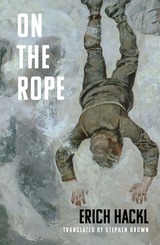
On the Rope
A Hero's Story
Erich Hackl
Haus Publishing, 2020
As German Jews, Regina Steinig and her daughter Lucia are forced into hiding during the Second World War. Finding refuge in the workshop of a local beltmaker, they hold on to each other as they live in constant fear of discovery by his neighbors and customers. When their hideaway is damaged in an air raid in the closing months of the war, the women are forced on the run and are locked in a desperate battle for survival.
Based on a true story, On the Rope is an account of extreme courage in the face of danger, violence, and hatred. Exploring themes of displacement and survival, friendship and family, it ends with the women’s efforts to bring recognition the selfless heroism of those who faced tremendous personal risk in order to protect them. A novella by one of Europe’s most prominent literary novelists, On the Rope layers deeply personal stories in a grounded historical account of life before, during, and after the Second World War. It paints a vivid picture of the hardships forced upon people by conflict and separation, depicting the forming and unravelling of relationships as a fact of life.
Based on a true story, On the Rope is an account of extreme courage in the face of danger, violence, and hatred. Exploring themes of displacement and survival, friendship and family, it ends with the women’s efforts to bring recognition the selfless heroism of those who faced tremendous personal risk in order to protect them. A novella by one of Europe’s most prominent literary novelists, On the Rope layers deeply personal stories in a grounded historical account of life before, during, and after the Second World War. It paints a vivid picture of the hardships forced upon people by conflict and separation, depicting the forming and unravelling of relationships as a fact of life.
[more]

Churchill
Sebastian Haffner
Haus Publishing, 2003
Winston Churchill (1874-1965, KG 1953) Conservative politician, Prime Minister 1940-5 and 1951-5. Perhaps the most determined and inspirational war leader in Britain's history, it was during that darkest summer of 1940 that Churchill's astonishing oratory seemed to rally the nation, from his opening statement to the House of Commons on May 13th that he had 'nothing to offer but blood, toil, tears and sweat'. Each successive crisis produced phrases that have resounded ever since, from the danger of invasion after the evacuation of troops from Dunkirk ('their finest hour') to the Battle of Britain (his tribute to the 'Few'). However, he lost the general election in June 1945. But he returned to Downing Street in 1951, finally retiring in 1955.
[more]
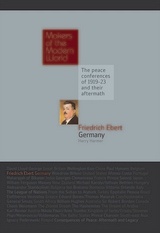
Friedrich Ebert
Germany
Harry Harmer
Haus Publishing, 2009
On 9 November 1918 Ebert became Imperial Chancellor as revolution broke out in Berlin. He opposed the radical left, declaring, 'Without democracy there is no freedom. Violence, no matter who is using it, is always reactionary', but he compromised Weimar democracy by his dependence on the army command and his use of the para-military Freikorps against the left. Ebert headed a joint SPD-USPD government until elections were held to a National Constituent Assembly in January 1919. Ebert became president of the new Weimar Republic (Germany's first democratically elected head of state) and retained office in a turbulent period in German politics. There were arguments among the Allies over how Germany should be treated, as France, Britain and the United States prioritised different objectives. In May 1919, the terms of the Treaty - on reparations, war guilt clause, loss of territories in Europe and colonies, limitations on armed forces - were presented to German representatives, precipitating opposition in government and the Armed Forces, and heated discussion in Cabinet. He continued as President until 1925, forced to confront the issues that arose from the Treaty and its political and economic consequences. After his death came the unravelling of the Treaty and the book examines how much of a part it played in creating the circumstances of the Second World War.
[more]
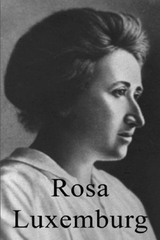
Luxemburg
Harry Harmer
Haus Publishing, 2003
This new biography takes a fresh view, re-examining Luxemburg's tempestuous career and her dream of socialism
[more]

Campbell-Bannerman
Roy Hattersley
Haus Publishing, 2006
A biography of the intriguing life of the unknown Liberal British Prime Minister.
[more]
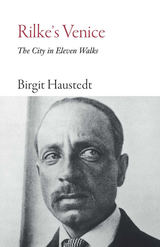
Rilke's Venice
Birgit Haustedt
Haus Publishing, 2019
For the Austrian poet and novelist Rainer Maria Rilke, travel was not only integral to his work, it was a way of life. Venice stands out as a location of particular importance to Rilke, and he visited the city ten times between 1897 and 1920. This city has inspired countless writers and artists, but Rilke, both enthralled and provoked by it, reveals a striking and deeply felt love for the city. He was as eager to explore the city’s underbelly, its deserted shipyards and back alleys, as he was to experience its iconic sights of St. Mark’s and the Doge’s Palace. Staying in both simple guesthouses and the grand palaces of his patrons, Rilke would walk prodigiously. His contemporary Stefan Zweig commented that “knowing every last corner and depth of the city was his passion” and Rilke himself said his walking allowed him to “grasp the whole breadth of the city.”
In eleven walks, Birgit Haustedt guides readers through Venice following the poet’s footsteps. Haustedt invites us to look on the beloved sights of the city through Rilke’s eyes, offering a new vision of this famed destination. Rilke’s Venice provides new insight into one of the finest and most widely recognized writers of the twentieth century. It also acts as a literary travel companion and guidebook to Venice, offering eleven detailed maps of walks through the city.
In eleven walks, Birgit Haustedt guides readers through Venice following the poet’s footsteps. Haustedt invites us to look on the beloved sights of the city through Rilke’s eyes, offering a new vision of this famed destination. Rilke’s Venice provides new insight into one of the finest and most widely recognized writers of the twentieth century. It also acts as a literary travel companion and guidebook to Venice, offering eleven detailed maps of walks through the city.
[more]

The Noble Army
The Modern Martyrs of Westminster Abbey
James Hawkey
Haus Publishing, 2024
The narratives of the figures behind the ten statues of martyrs at the Westminster Abbey.
In July 1998, ten statues of martyrs of the twentieth century were unveiled surmounting the Great West Door of Westminster Abbey. Ten figures were identified from different continents and different churches: victims of Nazi and Bolshevik oppression, state-sponsored violence, and religious hatred, these images stand as a testimony to the bloodshed of the twentieth century. Some, such as Oscar Romero and Martin Luther King, are famed across the world. Others are less known.
The Noble Army offers reflections on each of these ten lives, explores the questions surrounding their choices, and tells us the stories behind them. These statues were intended to represent those millions of individuals who suffered for their faith in Christ in the twentieth century. These reflections culminate in a chapter on the contemporary reality of Christian marginalization and persecution, written by Archbishop Bashar Warda of Erbil, Iraq.
In July 1998, ten statues of martyrs of the twentieth century were unveiled surmounting the Great West Door of Westminster Abbey. Ten figures were identified from different continents and different churches: victims of Nazi and Bolshevik oppression, state-sponsored violence, and religious hatred, these images stand as a testimony to the bloodshed of the twentieth century. Some, such as Oscar Romero and Martin Luther King, are famed across the world. Others are less known.
The Noble Army offers reflections on each of these ten lives, explores the questions surrounding their choices, and tells us the stories behind them. These statues were intended to represent those millions of individuals who suffered for their faith in Christ in the twentieth century. These reflections culminate in a chapter on the contemporary reality of Christian marginalization and persecution, written by Archbishop Bashar Warda of Erbil, Iraq.
[more]

Trust in Public Life
James Hawkey
Haus Publishing, 2023
A deep and thoughtful reflection on trust in the context of public life.
Trust in Public Life is a collection of essays addressing the importance of trust in public life and how public servants can engender and sustain it. In “The Roots of Trust,” Anna Rowlands argues that our loss of trust is a feature of modernity that can only be solved through encounters with real people. In “Trust in Oneself,” Claire Gilbert makes the case that leaders need to have self-trust and confidence to rule. In “Trust in Institutions,” Anthony Ball offers a guide to rebuilding trust in institutions through four virtues: honesty, humility, compassion, and competence. Finally, in “Trust in People,” James Hawkey argues that trust between groups is a choice, not something that can be injected like a vaccine. Together, the essays offer valuable reflections on trust in public life, agreeing that it must be engendered, and offer guidance on how this might be achieved.
Trust in Public Life is a collection of essays addressing the importance of trust in public life and how public servants can engender and sustain it. In “The Roots of Trust,” Anna Rowlands argues that our loss of trust is a feature of modernity that can only be solved through encounters with real people. In “Trust in Oneself,” Claire Gilbert makes the case that leaders need to have self-trust and confidence to rule. In “Trust in Institutions,” Anthony Ball offers a guide to rebuilding trust in institutions through four virtues: honesty, humility, compassion, and competence. Finally, in “Trust in People,” James Hawkey argues that trust between groups is a choice, not something that can be injected like a vaccine. Together, the essays offer valuable reflections on trust in public life, agreeing that it must be engendered, and offer guidance on how this might be achieved.
[more]
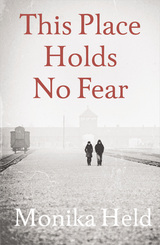
This Place Holds No Fear
Monika Held
Haus Publishing, 2014
Summoned from Vienna to Frankfurt to testify at the Auschwitz trials, Heiner meets Lena, who is working at the court as a translator. During the trial, he describes his experiences of being deported to Auschwitz as a young man. Afterward, the two begin a cautious love affair, but both are unsure whether their feelings will be strong enough to persevere in the shadow of his earlier ordeals. Heiner knows that if they are to stay together, Lena will have to accept the memories of Auschwitz that mark him and build a new life amid the debris of his past.
In this moving novel, Monika Held draws on first-hand reports by Auschwitz survivors to paint an emotive picture of life and love governed by trauma. Throughout, Heiner’s suffering is omnipresent, and Lena’s struggle to hold her own in a relationship dominated by his past is deeply moving. His stories are horrific and disturbing, but they are a part of his identity; he cannot survive without them. And slowly, Lena learns to cherish her own past despite its apparent insignificance.
With its sensitive treatment of two people struggling to confront the Holocaust’s atrocities from very different vantage points, This Place Holds No Fear is a powerful novel of finding love after experiencing unimaginable loss.
In this moving novel, Monika Held draws on first-hand reports by Auschwitz survivors to paint an emotive picture of life and love governed by trauma. Throughout, Heiner’s suffering is omnipresent, and Lena’s struggle to hold her own in a relationship dominated by his past is deeply moving. His stories are horrific and disturbing, but they are a part of his identity; he cannot survive without them. And slowly, Lena learns to cherish her own past despite its apparent insignificance.
With its sensitive treatment of two people struggling to confront the Holocaust’s atrocities from very different vantage points, This Place Holds No Fear is a powerful novel of finding love after experiencing unimaginable loss.
[more]
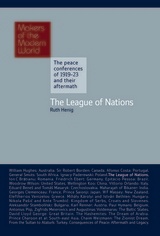
The League of Nations
Ruth Henig
Haus Publishing, 2010
Ninety years ago, the League of Nations convened for the first time hoping to create a safeguard against destructive, world-wide war by settling disputes through diplomacy. This book looks at how the League was conceptualized and explores the multifaceted body that emerged. This new form for diplomacy was used in ensuing years to counter territorial ambitions and restrict armaments, as well as to discuss human rights and refugee issues. The League’s failure to prevent World War II, however, would lead to its dissolution and the subsequent creation of the United Nations. As we face new forms of global crisis, this timely book asks if the UN’s fate could be ascertained by reading the history of its predecessor.
[more]
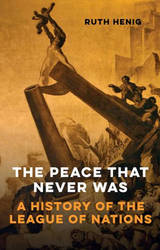
The Peace That Never Was
A History of the League of Nations
Ruth Henig
Haus Publishing, 2010
Ninety years ago, the League of Nations convened for the first time, hoping to create a safeguard against destructive, world-wide war by settling disputes through diplomacy. This book looks at how the League was conceptualized and explores the multifaceted body that emerged. This new form for diplomacy was used in ensuing years to counter territorial ambitions and restrict armaments, as well as to discuss human rights and refugee issues. The League’s failure to prevent World War II, however, would lead to its dissolution and the subsequent creation of the United Nations. As we face new forms of global crisis, this timely book asks if the UN’s fate could be ascertained by reading the history of its predecessor.
[more]
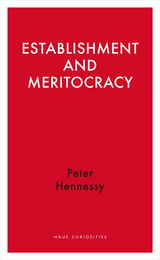
Establishment and Meritocracy
Peter Hennessy
Haus Publishing, 2014
Like so many of the postwar generation in Britain, Peter Hennessy climbed the ladders of opportunity set up by the 1944 Education Act designed to encourage a more meritocratic society. In this highly personal book, Hennessy examines the rise of meritocracy as a concept and the persistence of the shadowy notion of an establishment in Britain’s institutions of state. He asks whether these elusive concepts still have any power to explain British society, and why they continue to fascinate us. To what extent are the ideas of meritocracy and the establishment simply imagined? And if a meritocracy rose in the years following 1945, has it now stalled?
With its penetrating examination of the British school system and postwar trends, Establishment and Meritocracy is an important resource for those concerned about the link between education and later success, both for individuals and their societies.
With its penetrating examination of the British school system and postwar trends, Establishment and Meritocracy is an important resource for those concerned about the link between education and later success, both for individuals and their societies.
[more]
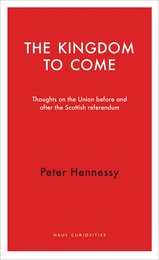
The Kingdom to Come
Thoughts on the Union before and after the Scottish Independence Referendum
Peter Hennessy
Haus Publishing, 2015
Despite the “No” vote in the Scottish Independence Referendum of September 2014, the issue of potential Scottish secession from the United Kingdom has likely only just begun. The Kingdom to Come is the first book-length look at the consequences and implications of this momentous event.
Peter Hennessy discusses the run-up to the Scottish Independence Referendum and its immediate aftermath, as well as the constitutional issues the referendum opened for the entire United Kingdom. This book includes Hennessy’s personal impressions of recent questioning of the Acts of Union that created Great Britain and describes when he, as the top expert on Britain’s unwritten constitution, became an important voice in what might happen next. The Kingdom to Come also offers a valuable examination of the possible agenda for remaking the constitution in both the medium and long term.
Peter Hennessy discusses the run-up to the Scottish Independence Referendum and its immediate aftermath, as well as the constitutional issues the referendum opened for the entire United Kingdom. This book includes Hennessy’s personal impressions of recent questioning of the Acts of Union that created Great Britain and describes when he, as the top expert on Britain’s unwritten constitution, became an important voice in what might happen next. The Kingdom to Come also offers a valuable examination of the possible agenda for remaking the constitution in both the medium and long term.
[more]

Land of Shame and Glory
Britain 2021–22
Peter Hennessy
Haus Publishing, 2023
A compelling account of the transformative changes Britain is facing today, exploring how we can build a post-COVID society.
2021 and 2022 were two of the most turbulent and disruptive years experienced by Britain in peacetime. Land of Shame and Glory: Britain 2021–22 addresses a series of unprecedented challenges that laid bare the fragility of Britain and the Union during this time. Beginning with the chaotic Fall of Kabul, which exposed Britain's military dependence on the United States, through the prolonged, unsatisfying removal of a prime minister—and the economically catastrophic, short-lived tenure of his successor—that further exposed the vulnerabilities of an unwritten constitution; to the country sweltering in record-breaking temperatures amid dire warnings of climate catastrophe; and finally, to the death of a much-loved monarch, who was a point of consistency during decades of tremendous social and technological change. Peter Hennessy considers the continuities and upheavals of the last seventy years, asking whether there can be said to have been a second Elizabethan Age and lamenting that the post-war period came to its close amid such upheaval and loss.
2021 and 2022 were two of the most turbulent and disruptive years experienced by Britain in peacetime. Land of Shame and Glory: Britain 2021–22 addresses a series of unprecedented challenges that laid bare the fragility of Britain and the Union during this time. Beginning with the chaotic Fall of Kabul, which exposed Britain's military dependence on the United States, through the prolonged, unsatisfying removal of a prime minister—and the economically catastrophic, short-lived tenure of his successor—that further exposed the vulnerabilities of an unwritten constitution; to the country sweltering in record-breaking temperatures amid dire warnings of climate catastrophe; and finally, to the death of a much-loved monarch, who was a point of consistency during decades of tremendous social and technological change. Peter Hennessy considers the continuities and upheavals of the last seventy years, asking whether there can be said to have been a second Elizabethan Age and lamenting that the post-war period came to its close amid such upheaval and loss.
[more]
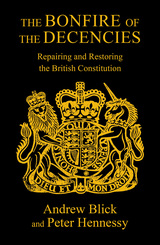
The Bonfire of The Decencies
Repairing and Restoring the British Constitution
Peter Hennessy
Haus Publishing, 2022
A reflection on the state of democracy and observance of the British constitution in the United Kingdom.
In The Bonfire of the Decencies, Peter Hennessy and Andrew Blick use Boris Johnson’s tenure as prime minister to argue that mechanisms for the upholding of constitutional principles in the United Kingdom are deficient and require an overhaul. They show that, from the outset, Johnson’s time in office was a source of serious disruption that saw standards and integrity compromised, as well as constitutional values violated. Those problems, however, did not end with Johnson’s removal from office. Rather, they are part of longer-term tendencies in the UK, and of a worrying international trend towards the weakening of democracy. Hennessy and Blick analyze the pre-existing vulnerabilities that Johnson exposed in the UK system of government and conclude with a series of proposals to repair the damage and prevent a repetition of this anxious episode in the UK’s political history.
In The Bonfire of the Decencies, Peter Hennessy and Andrew Blick use Boris Johnson’s tenure as prime minister to argue that mechanisms for the upholding of constitutional principles in the United Kingdom are deficient and require an overhaul. They show that, from the outset, Johnson’s time in office was a source of serious disruption that saw standards and integrity compromised, as well as constitutional values violated. Those problems, however, did not end with Johnson’s removal from office. Rather, they are part of longer-term tendencies in the UK, and of a worrying international trend towards the weakening of democracy. Hennessy and Blick analyze the pre-existing vulnerabilities that Johnson exposed in the UK system of government and conclude with a series of proposals to repair the damage and prevent a repetition of this anxious episode in the UK’s political history.
[more]
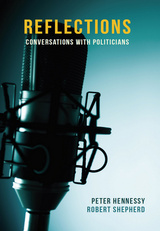
Reflections
Conversations with Politicians
Peter Hennessy
Haus Publishing, 2016
“The historian,” wrote E. L. Doctorow, “will tell you what happened. The novelist will tell you what it felt like.” This book sees Peter Hennessy and Robert Shepard combine both approaches with the art of the interviewer, a craft at once sensitive and probing.
Reflections collects transcripts of the best interviews from the BBC Radio 4 series Reflections with Peter Hennessy, a show on which the British political elite have spoken candidly about their careers and the moments that came to define their political lives. Supplementing the interviews are short biographies and profiles of the interviewees, allowing readers a fuller picture of each speaker’s background and professional trajectory. This revealing book includes conversations with political heavyweights such as former prime minister John Major; former foreign secretaries Margaret Beckett, David Owen, and Jack Straw; Labour Party leader Neil Kinnock; Liberal Party leader David Steel; and chancellor of exchequer Nigel Lawson. In addition, Reflections presents interviews with leading women, including Shirley Williams and Clare Short, who spent years at the forefront of their parties in Westminster.
The latest volume in the popular Haus Curiosities series, Reflections offers valuable insights from some of today’s most influential political figures.
Reflections collects transcripts of the best interviews from the BBC Radio 4 series Reflections with Peter Hennessy, a show on which the British political elite have spoken candidly about their careers and the moments that came to define their political lives. Supplementing the interviews are short biographies and profiles of the interviewees, allowing readers a fuller picture of each speaker’s background and professional trajectory. This revealing book includes conversations with political heavyweights such as former prime minister John Major; former foreign secretaries Margaret Beckett, David Owen, and Jack Straw; Labour Party leader Neil Kinnock; Liberal Party leader David Steel; and chancellor of exchequer Nigel Lawson. In addition, Reflections presents interviews with leading women, including Shirley Williams and Clare Short, who spent years at the forefront of their parties in Westminster.
The latest volume in the popular Haus Curiosities series, Reflections offers valuable insights from some of today’s most influential political figures.
[more]
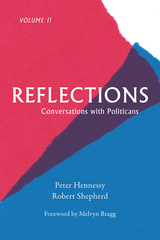
Reflections
Conversations with Politicians Volume II
Peter Hennessy
Haus Publishing, 2019
Accompanying the acclaimed BBC Radio 4 program, Reflections features interviews with twelve of Britain’s most influential political figures from the last twenty years. Presented by Peter Hennessy, one of the UK’s most renowned historians, each interview not only offers an honest and frank assessment of a political career, but also acts as a biography filled with fresh insights and moments of new revelation. From one of the longest-serving Prime Ministers and three of the Conservative leaders who stood against him, to dominant figures of late Thatcherism, stalwarts of successive New Labour cabinets, and leaders of the Liberal Democrats, Hennessy brings his characteristic style to each encounter. The politicians included in this volume are: Tony Blair, Michael Heseltine, Vince Cable, Margaret Hodge, William Hague, Harriet Harman, Michael Howard, Paddy Ashdown, Sayeeda Warsi, David Blunkett, Iain Duncan Smith and Kenneth Baker.
[more]
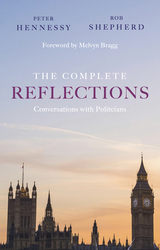
The Complete Reflections
Conversations with Politicians
Peter Hennessy
Haus Publishing, 2020
On the BBC radio show Reflections with Peter Hennessy, the preeminent historian of British political life interviewed leading figures from the UK’s governing parties during the late twentieth and early twenty-first centuries. Bringing together transcripts of the collected interviews for the first time, The Complete Reflections features interviews the biggest names from the Thatcher era, the New Labour years, and the coalition government of the 2010s.
In The Complete Reflections, Peter Hennessy and Robert Shepherd provide not only an overview of the past three decades of British politics but also delve into the minds of those at the forefront of public life during times of great change. Hennessy’s deep knowledge and understanding of the lives and motivations of his interviewees, along with the obvious esteem in which they hold their interlocutor, leads to frank and revealing conversations in which the subject is not an object but an equal, giving these exchanges a unique veracity. The results are portraits of high authority, in which interviews become the chronicles that endure above all others—nothing less than the first draft of history.
In The Complete Reflections, Peter Hennessy and Robert Shepherd provide not only an overview of the past three decades of British politics but also delve into the minds of those at the forefront of public life during times of great change. Hennessy’s deep knowledge and understanding of the lives and motivations of his interviewees, along with the obvious esteem in which they hold their interlocutor, leads to frank and revealing conversations in which the subject is not an object but an equal, giving these exchanges a unique veracity. The results are portraits of high authority, in which interviews become the chronicles that endure above all others—nothing less than the first draft of history.
[more]
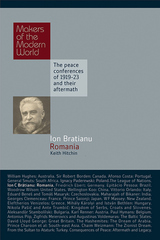
Ionel Bratianu
Romania
Keith Hitchins
Haus Publishing, 2011
At the beginning of 1918 the British War Cabinet endorsed the view of the Prime Minister, David Lloyd George, that after the war "Austria-Hungary should be in a position to exercise a powerful influence in south-east Europe." These reassuring professions were the essence of hypocrisy, since the Allies had already given away, at least on paper, large chunks of Austro-Hungarian territory as bribes to potential allies. In 1916 Romania was promised the whole of Transylvania, the Banat - both components of historic Hungary - and the Bukovina in return for her entry into the war. These promises persuaded the Romanian Prime Minister Ion Bratianu (1864-1927) to intervene in the war on the side of the Allies in 1916. He lead the Romanian delegation to the Paris Peace Conference, where he insisted on those promises to be fulfilled. His often-strained relations with the Big Four and the Supreme Council were further eroded when Romania invaded Hungary. Romania, however, in the end signed and adhered to the Treaty of Saint-Germain-en-Laye with Austria, Neuilly-sur-Seine with Bulgaria, the Treaty of Paris (1920), the Treaty of Trianon with Hungary, and the minorities treaty.
[more]
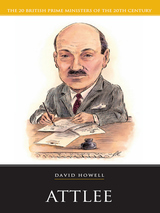
Attlee
David Howell
Haus Publishing, 2006
Former British Prime Minister best known for the creation of the National Health Service.
[more]
READERS
Browse our collection.
PUBLISHERS
See BiblioVault's publisher services.
STUDENT SERVICES
Files for college accessibility offices.
UChicago Accessibility Resources
home | accessibility | search | about | contact us
BiblioVault ® 2001 - 2024
The University of Chicago Press









